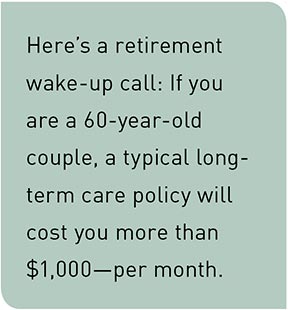HOME | ABOUT US | MEDIA KIT | CONTACT US | INQUIRE
HOME | ABOUT US | MEDIA KIT | CONTACT US | INQUIRE

 */?>
*/?>
Baby Boomers are aging. The sooner you accept this reality, and plan for an extremely likely future need, the more options you will have.
Families are spread across the country, making it difficult to care for aging relatives. Plus, with people living longer and requiring more intensive care, many don’t really want their children caring for them. Mothers, do you really want your
son bathing you and changing your diapers?
The average cost of a skilled-nursing facility in the Kansas City area is $7,000 per month. The greatest threat to the financial security of aging Americans today is the cost of long-term care!
Your odds of needing such care in an assisted-living or skil-led-nursing facility are greater than 50 percent. The cost of long-term care depletes most people’s assets in just a few months. Your options are: Pay for it yourself, use long-term care insurance, or qualify for a government program such as VA Aid & Attendance or Medicaid. Over half of residents in skilled-nursing facilities receive Medicaid benefits.
Medicare pays for short-term health-care expenses, but not for chronic conditions such as Alzheimer’s, stroke, Parkinson’s, diabetes, or others that require long-term care.

Even people with long-term care insurance are susceptible to large premium increases. I recently met with an 80-year-old couple who had paid on their long-term care policy for 25 years. This year, their premium increased 33 percent, to $1,200 per month.
If you are a 60-year-old couple, a typical long-term care policy will cost more than $1,000 per month. If you can qualify, that is. Medical issues such as high blood pressure, depression or a history of cancer may make you uninsurable.
Veteran’s Aid & Attendance benefits are for veterans and their surviving spouses, who have limited assets and income. An asset protection trust can be used to manage assets transferred from veterans to qualify for this benefit. Unlike Medicaid, there is no application “look-back” period. The VA benefit is limited to $2,120 per month for married veterans, or $1,149 per month for a surviving spouse. This is helpful for assisted living, but not enough if skilled nursing care is needed later. Planning done by aggressive financial advisers, to assist in the qualification for VA benefits, can be short-sighted. Some planning can disqualify the veteran for Medicaid for up to five years. The VA benefit is not enough to pay for the $7,000 per month cost of a skilled-nursing facility.
While not ideal, Medicaid is an excellent program for many middle and upper middle-class families faced with the cost of long-term care in a skilled-nursing facility.
Government inspections ensure that the quality of care in facilities that accept Medicaid is equivalent to that provided in expensive private-pay facilities. My experience working with several thousand families over 25 years confirms this.
The Medicaid Division of Assets and Division of Income programs are great for married couples when one spouse requires nursing-home care. In most cases, the assets of both spouses can be used for the benefit of the community spouse and protected from long-term expenses.
In the case of a single person, or if both spouses need that level of care, typically about one-half of assets can be protected. These assets can then be used for expenses not covered by Medicaid, or to benefit other family members. The use of an asset-protection trust can facilitate these benefits. Medicaid applications are complex. The legal techniques required to ensure these benefits require the expertise of an experienced elder law attorney.
Start long-term care planning now to maximize your options. If you are like most people, and need it at some point, you can lose everything! There are solutions, if you plan ahead. Even Baby Boomers, are not invincible. Proactive = Options.